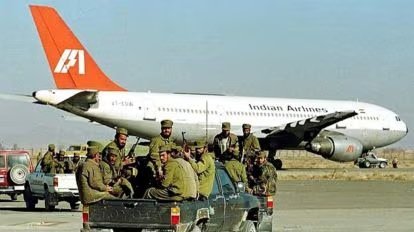Rise of Pak terror master Masood Azhar recalling the arrest of IC-814
The hijacking of Indian Airlines flight IC-814 in 1999 is one of the darkest chapters in Indian history. The Christmas Eve incident not only shook the country, but played a major role in the rise of one of the world’s most notorious terrorists, Masood Azhar. But beyond the drama, it is a heartbreaking tale of fear, geopolitics and colossal scientific failure.
IC-814 hijacking: A brief overview
On December 24, 1999, six Pakistani terrorists hijacked Indian Airlines Flight IC-814 from Kathmandu to Delhi shortly after takeoff. The plane, carrying 176 passengers and crew, was flown to several locations, including Amritsar, Lahore, and finally Kandahar in Afghanistan, then under Taliban control The hijackers’ primary demand? Harkat-ul-Ansar General Secretary Masood Azhar got out of jail in India.
Sequences rekindle old wounds
A recent series of fictional OTTs about the capture of IC-814 has generated further excitement and controversy. Interestingly, the series pays tribute to two IPS officers who were not directly involved in fighting terrorism during their careers. One was an intelligence officer who later became the Joint Director of the Multi-Agency Center during the 26/11 Mumbai attacks. The other was the director of the Special Protection Group for the prime minister’s security. Their inclusion in the series raised eyebrows, but the real issue was the geopolitics of the time.
Geopolitical Context: A World in Transition
The 1990s were a turning point in geopolitics. The West was still basking in its victory over the breakup of the Soviet Union in 1991. Then the Afghan Mujahideen, once hailed as freedom fighters by the West, were rebranded as terrorists after 9/11 the world and now Pakistan sponsors terrorism in Jammu and Kashmir was the works of ‘macho Pathans’ by the Western media It was being romanticised. During this period, India was isolated on the global stage, especially after the nuclear test at Pokhran in May 1998. The West, except France, treated India as a pariah state and tolerated it.

Conspiracy: Suspected in Rawalpindi
A plan was carefully hatched to pick up IC-814 at Rawalpindi, Pakistan’s military headquarters. The objective was clear: to pressure India to release Masood Azhar, whom Pakistan’s deep state views as a valuable asset. Azhar’s colleague Sajjad Afghani was killed in an attempted prison break in July 1999 and it was feared that Azhar might meet the same fate.
Azhar’s brother, Mohammad Ibrahim Athar Alvi, and other associates carried out the kidnappings using the ISI’s main network in Kathmandu. Indian intelligence agencies were completely arrested and there was no hint of conspiracy. This lack of preparation was further confirmed by the presence of an undercover RAW agent on board the hijacked flight.
Role of Pakistan: State-sponsored terror machine
Despite international pressure and UN designation as a terrorist, Masood Azhar continues to enjoy state protection in Pakistan. Living in a safe house, his brother Rauf Asghar is active, directing JM’s activities in Jammu and Kashmir with impunity. Pakistan’s deep state support for this terrorism is an open secret, and little has been done to dismantle the success factors of groups like JM
History repeating itself: 26/11 Mumbai attacks The capture of IC-814 was not the only case in which terrorism ignored India. The 26/11 Mumbai attacks in 2008 was another glaring example of intelligence failure and lack of decisive leadership. Although there were usable advance reports of the attack, the response was slow and disorganized, costing 166 lives.
Lessons found out: Vigilance and sturdy leadership are crucial
The capture of IC-814 and its aftermath is a stark reminder of the ever-gift chance and the importance of sturdy and decisive management Past screw ups, mainly the incapability to prevent humans such as Masood Azhar on the verge of rise highlights the need for endured vigilance and a pre-emptive approach to national protection.
India’s experiences also underscore the importance of international cooperation in combating terrorism. The global community must recognize and address the state-sponsored nature of terrorism in Pakistan, which continues to destabilize the region.
Read More: What is research design? It is to introduce the basics in a few uncomplicated sentences.
Conclusion
The memories of the IC-814 hijacking still haunt the nation, but they also serve as a testament to India’s resilience. Despite the challenges and setbacks, India has continued to strengthen its security apparatus and has become more assertive on the global stage. The fight against terrorism is far from over, but with a united front and unwavering resolve, India can and will prevail.







